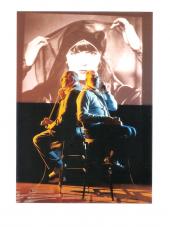`A.K.A. Doc Pomus': Save the last dance for the crippled Jewish boy
A crippled white boy hooked on the blues, Jerome Felder -- "A.K.A. Doc Pomus" -- is wonderfully rediscovered in this terrific new singer-songwriter documentary.
You may not know his name, but if you're a rhythm & blues or early rock fan of a certain age, you know his songs and who sang them: "This Magic Moment" (Ben E. King), "A Teenager in Love" (Dion & the Belmonts), "Young Blood" (the Coasters), "Sweets for My Sweet" (the Drifters), "Lonely Avenue" (Ray Charles), "There Must Be a Better World" (B.B. King), "Can't Get Used to Losing You" (Andy Williams).
Oh, yeah, plus a few dozen tunes -- including "A Mess of Blues," the "Girl Happy" and "Viva Las Vegas" songs, and the deliciously evil "Little Sister" -- for Elvis Presley.
Brooklyn-born Pomus (1925-1991), an anomalous icon, was paralyzed with polio at age 6. As a teen, he was inspired by a Big Joe Turner blues song to brazen his way into Greenwich Village clubs -- an overweight Jewish R&B singer on crutches, often the only white person there. He would write and cut some 50 singles before concentrating on songwriting and teaming up with Mort Shuman -- later, with Phil Spector -- for a long string of hits.
Doc's lively doc, beautifully assembled and edited by Peter Miller and Will Hechter, is chock-full of great music, '50s-'60s archival footage, and insights from his actress-wife Willi Burke, best buds Dr. John and Lou Reed (the latter reads excerpts from Pomus' diaries), and many others -- my favorite being the eternally youthful Dion.
All attest, in different ways, to the man's enormously generous spirit and role of guardian angel for all the down-and-out -- and up-and-coming -- musicians who came to his Westover Hotel apartment on W. 72nd Street in search of help and mentoring. His underdog kinship with "people stumbling around in the night out there, uncertain of where they fit in and where they were headed" -- especially black bluesmen -- was legendary.
So, unfortunately, was his appetite (the 24-hour "Dial-a-Steak" number was always at hand) and his four-packs-of-Chesterfields a day cigarette habit. But the legendary quantity and quality of his songs outweigh even Doc himself.
This is an upbeat celebration of an amazingly eventful life lived on crutches. Art (especially R&B) comes from pain, they say. Even so, it's hard to believe that a huge, sedentary man confined to a wheelchair could write "Save the Last Dance for Me."





